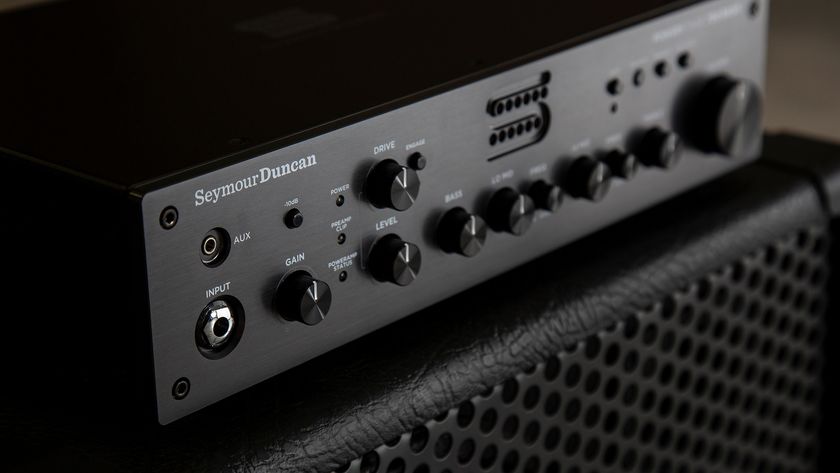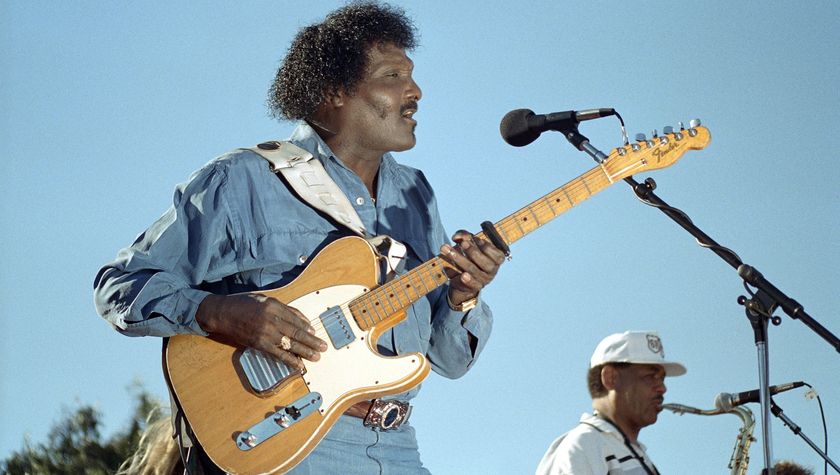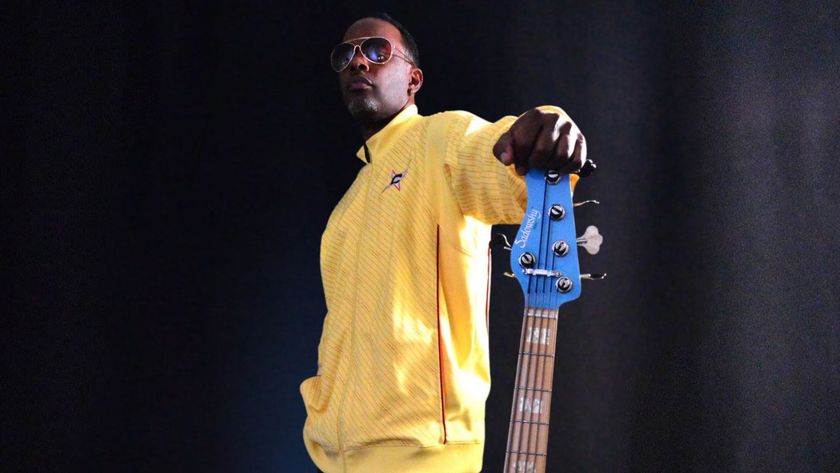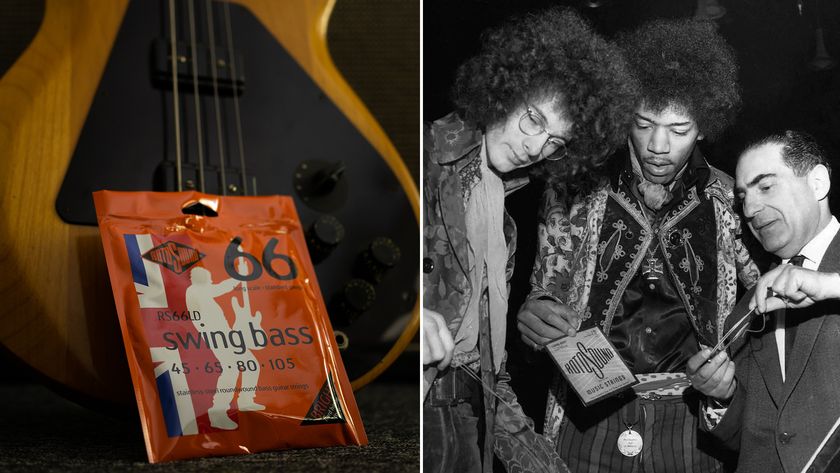Interview: Les Trois Accords Guitarist Alexandre Parr Discusses New Album, 'J'aime ta grand-mère'
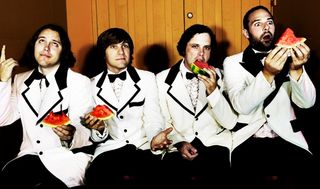
Take heart, lonely grandmothers. Quebec-based Francophone indie rockers Les Trois Accords have plenty of hugs 'n' kisses to go around. They've even named their new album J'aime ta grand-mère (I'm in love with your grandmother).
"I think we'll open a door for every grandmother who doesn't have a husband anymore so they can find love with a younger person," says lead guitarist Alexandre Parr. "But not grandfathers. Only grandmothers."
It's only fitting that an album dedicated to seniors is packed with vintage-inspired guitar tones, all of which were created with classic gear, including a host of guitars that pre-date 1969, original analog effects and crusty old guitar strings and drum heads.
The album's powerful first single, "Bamboula," recalls classic New Wave; the opener, "Personne préférée," is a shimmering nod to mid-'60s AM radio. "Son visage était parfait" recalls the gentler moments of With The Beatles.
The songs are full of puns and word play (all in French, of course), proof that Les Trois Accords haven't lost their bizarre sense of humor — or their knack for improving from album to album. The disc, which was recorded in Brooklyn, New York, with producers Gus Van Go and Werner F. and released October 23 by La Tribu, represents the next step in the band's evolution from pop-punk to meticulously crafted — at times, beautiful — melodic rock.
The band's full lineup is Simon Proulx (vocals, guitar), Alexandre Parr (guitars, vocals), Pierre-Luc Boisvert (bass) and Charles Dubreuil (drums).
We recently connected with Parr to discuss Quebec's growing indie rock scene, the band's vintage gear and J'aime ta grand-mère.
Get The Pick Newsletter
All the latest guitar news, interviews, lessons, reviews, deals and more, direct to your inbox!
GUITAR WORLD: What gear did you use on this album? I know you're usually seen with a Gibson Classic Series Les Paul, and singer/guitarist Simon Proulx often uses a Telecaster, but the new album has a different, noticeably vintage sound.
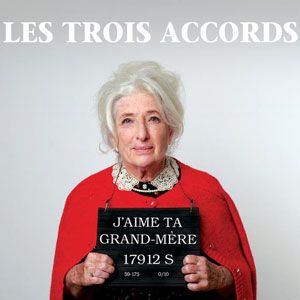
Simon and I used different guitars on this album. In terms of the instruments and the gear, nothing is younger than 1969. Even our strings are old. We only change them if they break, but if they don't break, we keep them for a lifetime. It's the same for the drums — old skins on old drums. For guitars, we used an old Harmony Silvertone, a ’64 Harmony Rocket, a ’68 Gibson Hummingbird and a reissue of a ’59 Gibson. The only new thing we used is Pro Tools.
We used only analog effects, like a Space Echo Delay, but a real one with the tape recorder [the Roland RE-201]. We used a lot of that on the clean guitars, and a lot of reverb, but real reverb in a [Fender] tank. The special thing with this album is that we recorded the acoustic guitars with a fake tape deck like The Rolling Stones did with "Street Fighting Man." Keith Richards was in his hotel room and he played the demo of the song for Mick Jagger. They kept the demo riff on the finished recording because they thought it sounded great. We did this on almost every song on the album.
What was it like working with producers Gus Van Go and Werner F.? How did their production style influence the band's approach to the album?
They influenced us to cut down on the distortion. Before we had more of a punk-rock style with distortion pedals. Now we're using older amps and getting natural distortion. This was Gus' main influence on us, even in the acoustic guitars. It's very impressive because he also distorted the bass a lot. When everything is in the mix, you don't feel that everything is distorted, but you feel like a little crunch.
Was the entire album recorded at Gus and Werner's studio in Brooklyn?
Yes, in Williamsburg. We did it there because we were far from home and our phones don't work there [laughs]. So we just concentrated on music.
Are all the songs on J'aime ta grand-mère totally new, or have some of them appeared on your set lists at various points?
No, they're all new songs that we've never performed before. Simon wrote them six months ago.
And everything on the album was written by Simon?
Yes, Simon does everything, the music and the lyrics. Basically, we add our instruments to the songs, but he has a very good vision of what he wants to hear.
I'm particularly fond of "Exercice" on the new album. You hear the (what I consider) dramatic chord changes — Am to F to C to E7 — then you listen to the lyrics about being jealous of little fat kids, and it just doesn't match at all, yet it works.
Yes, "I like fat babies that don't do exercise" [laughs].
Your playing style is stripped down and somewhat percussive. How you would describe your style, and who are your influences?
My first influence was Slash, and the first song I ever learned was "Sweet Child O' Mine" by Guns N' Roses. I do a solo similar to "Sweet Child O' Mine" on the first song on the new album ["Personne préférée"], a little solo in the high notes. Another influence was Stone Gossard from Pearl Jam because I'm a Gibson fan. Mike McCready, yeah, but I'm not a Fender player, you know? My main influences are always Gibson players — like Jimmy Page, always.
But there's one exception; I like Billy Corgan from Smashing Pumpkins, especially on their first album, which had a very nice distorted guitar sound. He had a big influence on me. And then there's The Strokes; I like a lot of their riffs and when the two guitars complement each other, working so well together. Sometimes we try to do that, but not that much. Not that cool, like them [laughs].
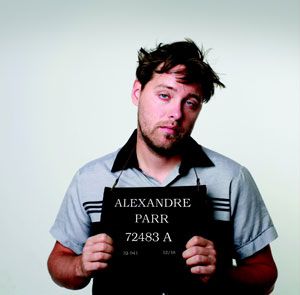
You've toured a lot in Quebec and Europe, especially France and other French-speaking countries. What are the differences between audiences in Quebec and France?
I think in France there is more ... how can I say this? When we clap our hands, in Quebec, it's cool to not do this. But if we clap our hands in France, everyone does it because it's a social thing. They're more social; I don't really know how to explain it, but in France when there are a lot of people, they feel it's cool to do the same thing [that we're doing]. But in Quebec, it's cool to not follow everything. And they sing with us a lot in France. In Quebec too, but not that seriously, you know? It's very intense, people from France.
In 2010, Karkwa, another francophone band from Quebec, won Canada's Polaris prize [awarded to the best Canadian album of the year] for Les chemins de verre, becoming the first French-language band to earn that honor. Is it just me, or does Quebec's francophone rock scene seem more vibrant and dynamic since then?
I think the scene is very nice in Montreal right now, but I see the scene as one thing, French and English together. There's Simple Plan, Arcade Fire and Malajube, who tour all over the world. But I think what's happening right now is very good for every musician, English and French. Everyone influences everyone. I hope one day that it won't be a matter of French or English — just music. They could be Spanish or Chinese, I don't care, you know? You just listen to the music.
Do you know a lot of the other Quebec artists, like Damien Robitaille?
Yeah, he's very funny and his music is very good. It's a little bit kitsch with an oldies influence that we like a lot.
Speaking of other Quebec artists, Quebec country music icon Renée Martel sings a duet with Simon on "Sur le bord du lac" on the new album. How did that collaboration happen?
She's a legend in Quebec country music, and she did rock and roll in the '60s. She's a big, big, big, big star in Quebec. She's from Drummondville, where we're from. Simon wrote a song for her. This was before the album; he wrote that song only for her. When it was time to record the album, Simon decided to call Renée and see if she wanted to sing it with us, and she said yes. So we're super-happy, and we think it's one of the most romantic songs on the album.
This is what it says in your Wikipedia entry: "Many of their newer songs can be classified as surrealist because of the frequent presence of puns, word play and unusual images." I know what they mean, but what do you think of the "surrealist" tag?
Well, in a way it makes sense because on the last album (2009's Dans mon corps), we had a lot of imagery in our songs. Maybe it could be surreal for someone who looks very, very close, but it's not that difficult to understand.
Speaking of imagery, there's your music video for "Dans mon corps," which features an actor lip syncing all the words, and the band doesn't appear in the video at all.
Yeah, we felt very good that nobody from the band appears in the video clip. And after that, the Black Keys stole our idea [laughs]. Tell them a band from Quebec already did that!
Although the new album came out in October, it looks like you don't have any shows scheduled until January. Why the long wait?
Yes, we're starting in January because we want people to hear the album. In past years, we did the tour right after the release, and it wasn't good because the people didn't know the songs yet. So that's why we make a little space before the tour.
What's with the whole grandmother thing?
Ah, the grandmother thing? [laughs] You know, everybody has a complicated love in the world, and there's nothing complicated about loving a grandmother. I think it's something very new. I think we'll open a door for every grandmother who doesn't have a husband anymore so they can find love with a younger person. But not grandfathers. Only grandmothers" [laughs].
OK, here's the most important question yet. Where can I find the best poutine in Montreal?
Hmmm. There's La Banquise and PoutineVille, which are very good. Those are two of the best places in Montreal. But Drummondville is the better place for poutine. We have a festival down there that we've organized for the past five years. Last year, we had about 25,000 people who came to Drummondville to hear music and eat poutine. It's the Drummondville Poutine Festival (Festival de la poutine de Drummondville). It's a big success; we're very happy to join the two best things in the world: poutine and music [laughs].
For more about Les Trois Accords, visit their official website and Facebook page.
[[ Read Damian Fanelli's review of Les Trois Accords' new album. ]]
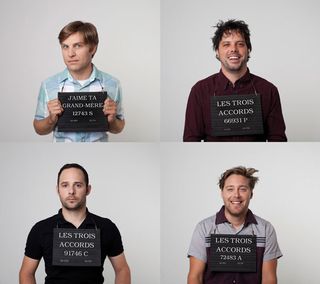

Damian is Editor-in-Chief of Guitar World magazine. In past lives, he was GW’s managing editor and online managing editor. He's written liner notes for major-label releases, including Stevie Ray Vaughan's 'The Complete Epic Recordings Collection' (Sony Legacy) and has interviewed everyone from Yngwie Malmsteen to Kevin Bacon (with a few memorable Eric Clapton chats thrown into the mix). Damian, a former member of Brooklyn's The Gas House Gorillas, was the sole guitarist in Mister Neutron, a trio that toured the U.S. and released three albums. He now plays in two NYC-area bands.

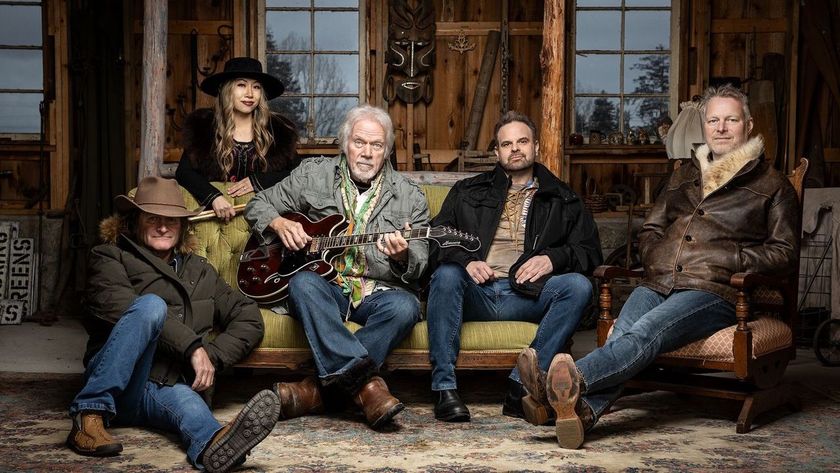

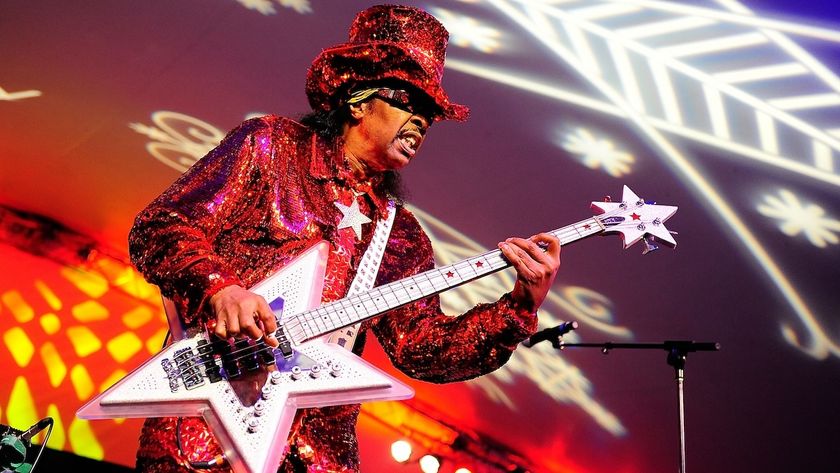
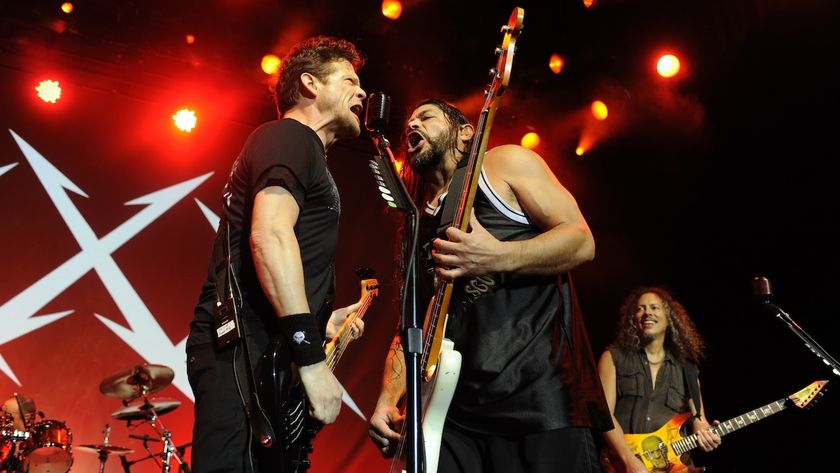
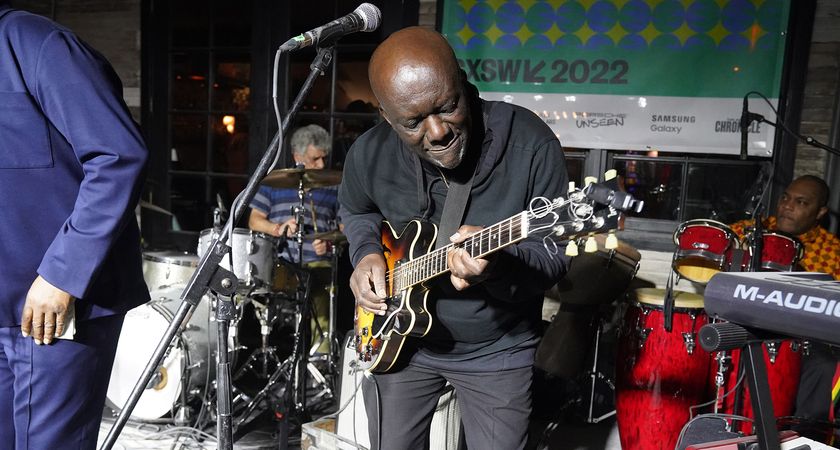
![[L-R] George Harrison, Aashish Khan and John Barham collaborate in the studio](https://cdn.mos.cms.futurecdn.net/VANJajEM56nLiJATg4P5Po-840-80.jpg)
